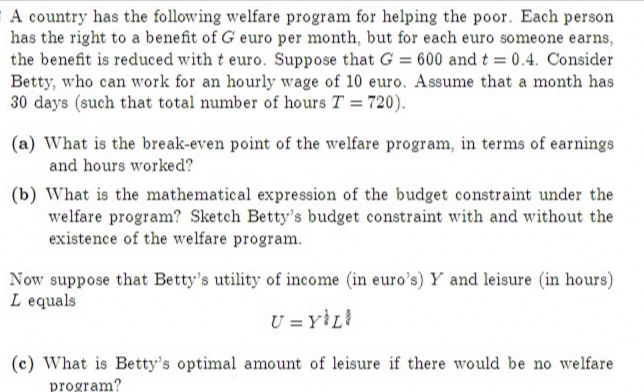A country has the following welfare program for helping the poor. Each person has the right to a benefit of G euro per month, but for each euro someone earns, the benefit is reduced with t euro. Suppose that G 600 and t 0.4. Consider Betty, who can work for an hourly wage of 10 euro. Assume that a month has 30 days (such that total number of hours T 720). (a) What is the break-even point of the welfare program, in terms of earnings and hours worked? (b) What is the mathematical expression of the budget constraint under the welfare program? Sketch Betty's budget constraint with and without the existence of the welfare program. Now suppose that Betty's utility of income (in euro's) Y and leisure (in hours) L equals U = Y}L! (c) What is Betty's optimal amount of leisure if there would be no welfare
A country has the following welfare program for helping the poor. Each person has the right to a benefit of G euro per month, but for each euro someone earns, the benefit is reduced with t euro. Suppose that G 600 and t 0.4. Consider Betty, who can work for an hourly wage of 10 euro. Assume that a month has 30 days (such that total number of hours T 720). (a) What is the break-even point of the welfare program, in terms of earnings and hours worked? (b) What is the mathematical expression of the budget constraint under the welfare program? Sketch Betty's budget constraint with and without the existence of the welfare program. Now suppose that Betty's utility of income (in euro's) Y and leisure (in hours) L equals U = Y}L! (c) What is Betty's optimal amount of leisure if there would be no welfare
Chapter16: Labor Markets
Section: Chapter Questions
Problem 16.3P
Related questions
Question

Transcribed Image Text:A country has the following welfare program for helping the poor. Each person
has the right to a benefit of G euro per month, but for each euro someone earns,
the benefit is reduced with t euro. Suppose that G = 600 and t = 0.4. Consider
Betty, who can work for an hourly wage of 10 euro. A ssume that a month has
30 days (such that total number of hours T = 720).
(a) What is the break-even point of the welfare program, in terms of earnings
and hours worked?
(b) What is the mathematical expression of the budget constraint under the
welfare program? Sketch Betty's budget constraint with and without the
existence of the welfare program.
Now suppose that Betty's utility of income (in euro's) Y and leisure (in hours)
L equals
U = Y}L!
(c) What is Betty's optimal amount of leisure if there would be no welfare
program?
Expert Solution
This question has been solved!
Explore an expertly crafted, step-by-step solution for a thorough understanding of key concepts.
Step by step
Solved in 3 steps

Recommended textbooks for you


Principles of Economics 2e
Economics
ISBN:
9781947172364
Author:
Steven A. Greenlaw; David Shapiro
Publisher:
OpenStax

Essentials of Economics (MindTap Course List)
Economics
ISBN:
9781337091992
Author:
N. Gregory Mankiw
Publisher:
Cengage Learning


Principles of Economics 2e
Economics
ISBN:
9781947172364
Author:
Steven A. Greenlaw; David Shapiro
Publisher:
OpenStax

Essentials of Economics (MindTap Course List)
Economics
ISBN:
9781337091992
Author:
N. Gregory Mankiw
Publisher:
Cengage Learning

Brief Principles of Macroeconomics (MindTap Cours…
Economics
ISBN:
9781337091985
Author:
N. Gregory Mankiw
Publisher:
Cengage Learning

Principles of Economics, 7th Edition (MindTap Cou…
Economics
ISBN:
9781285165875
Author:
N. Gregory Mankiw
Publisher:
Cengage Learning

Principles of Macroeconomics (MindTap Course List)
Economics
ISBN:
9781305971509
Author:
N. Gregory Mankiw
Publisher:
Cengage Learning